About NII
Greeting from the Director General
 KUROHASHI, Sadao
KUROHASHI, Sadao
Director-General, National Institute of Informatics
Inter-University Research Institute Corporation
Research Organization of Information and Systems
Informatics at the Center of a Shift from Competition to Collaboration
We live in a time of confusion, unsure about whether an era is ending or a new age is dawning.
The year (2024) kicked off with the Noto earthquake. As a country prone to earthquakes, we must accept them as natural disasters, but couldn't we be a little more creative in our risk preparation and disaster response? What about the ongoing and appalling situation of regional conflicts, which are purely man-made disasters? It is heartbreaking to see drones and other IT technologies used as high-tech killing machines. Other problems too numerous to mention are plaguing humanity too, such as population (both exploding and declining), poverty, food, and global warming.
At the same time, 2023 will go down in history as the year when the evolution of AI crossed a line, as its coexistence with humanity began in earnest. AI is now being used for both routine and creative tasks. It is also starting to be applied in medicine, law, and other fields that traditionally required the judgment of human experts.
Science, technology, and industry developed enormously through the 20th century, but too much emphasis was put on competition (though this should not be surprising, given that conflict has been a constant feature of human history). To resolve the plethora of complex social issues we face, we need to shift our values from competition to co-creation. In the academic and scientific realm, this movement is known as "open science." It was even highlighted at last year's G7 meeting. Starting in 2025, all scientific papers in Japan resulting from publicly funded research, as well as the data they are based on, are required to be immediately open access.
The NII has promoted the development of Japan's scientific information infrastructure for many years. Its SINET6 network is now used by more than 1,000 universities and research institutes. In 2017, NII set out to develop NII Research Data Cloud, a platform for publication, discovery, and management of academic information. It began operation in 2021. In 2022, the project was evolved with the development of a research data ecosystem, in cooperation with numerous universities and research institutes. In this advanced phase, research results will be fully deployed. The goal is to build and propagate an environment that enables easy access to papers, data, and computational resources in all research fields, and to smoothly facilitate new research projects, as well as new joint research initiatives across different disciplines.
Recognizing the large impact of generative AI on society and the need for a place in Japan where people can get experience in building and researching large language models (LLM), in May 2023, LLM-jp, a study group centered on NII, was formed. The group, based on the idea of making all activities and findings open, started out with about 30 researchers in natural language processing, but has grown to more than 1,000 participants from industry, government, and academia. By October 2023, it had developed and released a 13-billion-parameter LLM.
In April 2024, the LLM R&D Center will be established at NII to develop this initiative further and build a 175-billion-parameter model (of similar scale to GPT3). The work will also focus on ensuring model reliability and transparency.
Given that we live in an era of chaos, as mentioned at the outset, the relationship of humans to science and technology will be increasingly important. It will also be vital to rethink human values. Informatics is an academic discipline that lies at the interface of technology and people, but also takes a sweeping view of them. It therefore has a big responsibility and role to play in these efforts.
As a research institute of the Inter-University Research Institute Corporation, NII works not just on scientific information infrastructure and the LLMs presented here, but on a wide assortment of other informatics research and endeavors. Through collaboration with about 200 visiting faculty from all over Japan, NII pursues open, joint research projects. It has also signed MOUs with over 100 research bodies worldwide and hosts student interns from universities around the globe. There is saying, "If you want to go fast, go alone. If you want to go far, go together." Through this approach to informatics, we expect NII to contribute to the transition from an age of competition to one of co-creation.
April 2024

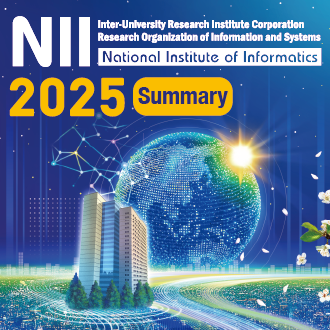 Summary of NII 2024
Summary of NII 2024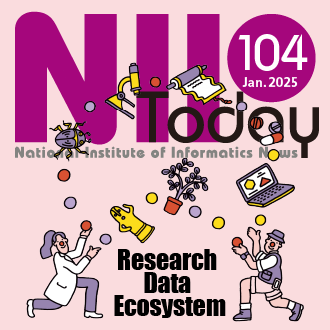 NII Today No.104(EN)
NII Today No.104(EN)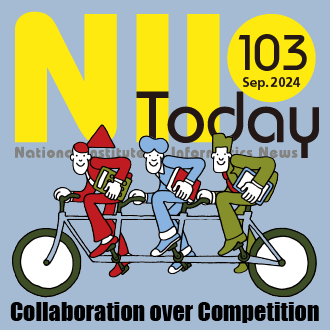 NII Today No.103(EN)
NII Today No.103(EN)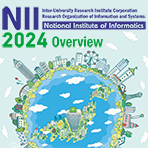 Overview of NII 2024
Overview of NII 2024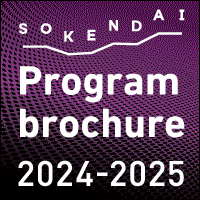 Guidance of Informatics Program, SOKENDAI 24-25
Guidance of Informatics Program, SOKENDAI 24-25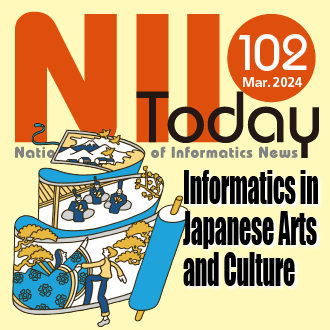 NII Today No.102(EN)
NII Today No.102(EN) SINETStream Use Case: Mobile Animal Laboratory [Bio-Innovation Research Center, Tokushima Univ.]
SINETStream Use Case: Mobile Animal Laboratory [Bio-Innovation Research Center, Tokushima Univ.] The National Institute of Information Basic Principles of Respect for LGBTQ
The National Institute of Information Basic Principles of Respect for LGBTQ DAAD
DAAD
